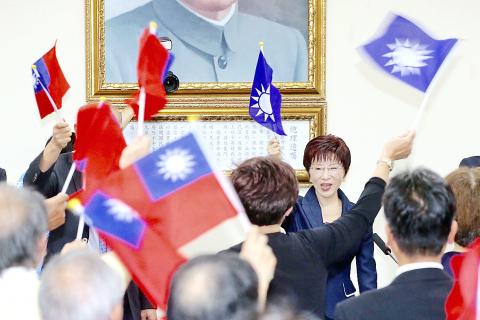Chinese Nationalist Party (KMT) presidential candidate Hung Hsiu-chu (洪秀柱) yesterday expressed confidence that she would secure victory in next year’s presidential race, saying her campaign’s polls showed her support rating trailing that of her Democratic Progressive Party (DPP) rival Tsai Ing-wen (蔡英文) by only a small margin.
Hung made the remarks at an event at KMT headquarters in Taipei yesterday morning attended by several Taiwanese businesspeople based overseas who support the deputy legislative speaker.
“The media have assumed that my opponent [Tsai] could win the election lying down,” Hung said.

Photo: CNA
“Despite this, I am confident and do not believe their assumptions are necessarily aligned with reality, as internal polls conducted by my campaign team suggest the two of us are closely matched,” she said.
Hung said on the sidelines of the event that the polls indicated the support ratings of all three candidates have shown some ups and downs.
The latest poll showed Tsai just 7 percentage points ahead of her, Hung added.
Asked whether the poll results had given her confidence a boost, Hung said she did not experience any major mood swings because she “has always remained confident.”
“I am certain that each step I have taken and every effort I have made would not go unnoticed in the eyes of my supporters,” she said.
“That is why there is no need to be bothered by outside disturbances,” Hung said.
According to a survey released by the Chinese-language Liberty Times (the Taipei Times’ sister paper) on Thursday, Tsai held a commanding lead among the candidates with 44.75 percent support.
People First Party Chairman James Soong (宋楚瑜) had 13.76 percent support, while Hung was at 12.13 percent, the Liberty Times survey showed.
A Taiwan Thinktank poll on Monday last week yielded similar results, showing Tsai having 47.6 percent support, against Hung’s 16.3 percent and Soong’s 13.9 percent.
Hung said her supporters overseas were a vital source of strength who have kept her from collapsing and motivated her to keep going.
“Cross-strait relations are of great importance and I hope they can be brought to the next level based on the 1992 consensus,” Hung said.
The so-called “1992 consensus” is a term former Mainland Affairs Council chairman Su Chi (蘇起) admitted making up in 2000 referring to a tacit understanding between the Chinese Nationalist Party (KMT) and Beijing that both sides acknowledge there is “one China,” with each side having its own interpretation of what “China” means.
She said she does not favor rapid unification with China as the public has assumed, but is guided by the Republic of China Constitution.
Tsai said later on the sidelines of a World Taiwanese Chambers Union trade forum in Taipei that she had not seen the “internal polls” Hung referred to and that she respected her statements.
Tsai said the results mentioned by Hung were “slightly discrepant” from those shown in surveys carried out by her campaign office.
As to whether there was a hint of competition between her and Hung given that both of them met with Taiwanese businesspeople yesterday, Tsai said the event she attended was simply a platform for her to exchange opinions with overseas entrepreneurs who had returned home to celebrate the Mid-Autumn Festival.
“Many of them are leaders among Taiwanese businesspeople based in Southeast Asian countries. Hopefully their support could help me get elected president,” Tsai said.

Alain Robert, known as the "French Spider-Man," praised Alex Honnold as exceptionally well-prepared after the US climber completed a free solo ascent of Taipei 101 yesterday. Robert said Honnold's ascent of the 508m-tall skyscraper in just more than one-and-a-half hours without using safety ropes or equipment was a remarkable achievement. "This is my life," he said in an interview conducted in French, adding that he liked the feeling of being "on the edge of danger." The 63-year-old Frenchman climbed Taipei 101 using ropes in December 2004, taking about four hours to reach the top. On a one-to-10 scale of difficulty, Robert said Taipei 101

Nipah virus infection is to be officially listed as a category 5 notifiable infectious disease in Taiwan in March, while clinical treatment guidelines are being formulated, the Centers for Disease Control (CDC) said yesterday. With Nipah infections being reported in other countries and considering its relatively high fatality rate, the centers on Jan. 16 announced that it would be listed as a notifiable infectious disease to bolster the nation’s systematic early warning system and increase public awareness, the CDC said. Bangladesh reported four fatal cases last year in separate districts, with three linked to raw date palm sap consumption, CDC Epidemic Intelligence

Two Taiwanese prosecutors were questioned by Chinese security personnel at their hotel during a trip to China’s Henan Province this month, the Mainland Affairs Council (MAC) said yesterday. The officers had personal information on the prosecutors, including “when they were assigned to their posts, their work locations and job titles,” MAC Deputy Minister and spokesman Liang Wen-chieh (梁文傑) said. On top of asking about their agencies and positions, the officers also questioned the prosecutors about the Cross-Strait Joint Crime-Fighting and Judicial Mutual Assistance Agreement, a pact that serves as the framework for Taiwan-China cooperation on combating crime and providing judicial assistance, Liang

US climber Alex Honnold left Taiwan this morning a day after completing a free-solo ascent of Taipei 101, a feat that drew cheers from onlookers and gained widespread international attention. Honnold yesterday scaled the 101-story skyscraper without a rope or safety harness. The climb — the highest urban free-solo ascent ever attempted — took just more than 90 minutes and was streamed live on Netflix. It was covered by major international news outlets including CNN, the New York Times, the Guardian and the Wall Street Journal. As Honnold prepared to leave Taiwan today, he attracted a crowd when he and his wife, Sanni,